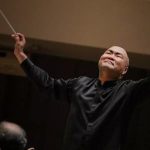Fado Vocalists: Mísia、Pedro Moutinho
Macao Chinese Orchestra
Mísia, Fado vocalist
Mísia, born in Porto, Portugal, comes from a multi-generation family of artist. She is a contemporary Portuguese singer, who is widely celebrated for the timeless and universal sentiments, which are part of her songs sung not only in her mother tongue but also in many other languages. Nobel Prize winner José Saramago wrote for her voice, and John Turturro chose Mísia for his film Passione. For many years she has built an international career on the most prestigious stages, such as: Berliner Philharmonika, Festival d’Avignon, São Carlos National Theatre in Lisbon, Théâtre du Châtelet in Paris, The Town Hall in New York, Queen Elizabeth Hall in London, Theatre Cocoon in Tokyo, amongst others. Her work has been mentioned in the press worldwide: Billboard, New York Times, Libération and Die Zeit.
Pedro Moutinho, Fado vocalist
Moutinho is one of the indisputable names of the younger fado singers generation. He grew up listening to some of the best voices of that culture recognised by Unesco, and moulded his clear voice and perfect diction in the fado houses where the only power amplification is the soul. Four albums into his career and with one Amália Award under his belt, Pedro has already proved he is blazing his own path, his own way. In 2016 he released O Fado em Nós. Recorded in the heart of the memory of fado singers at Fado Museum in Lisbon, this album has the taste of a live performance. Sara Pereira, the director of Fado Museum describes Moutinho’s voice as “one of the greatest voices of 21st century fado music”.
Duration: approximately 1 hour and 45 minutes, including one interval



